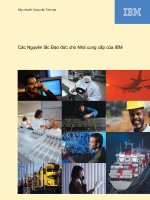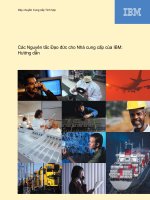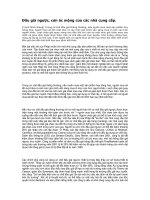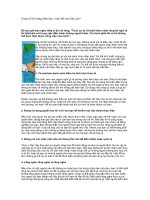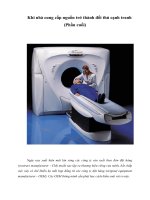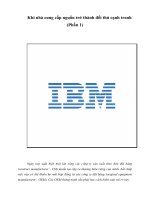Cấu hình chung Nhà cung cấp / Kỹ năng Framework ppt
Bạn đang xem bản rút gọn của tài liệu. Xem và tải ngay bản đầy đủ của tài liệu tại đây (624 KB, 41 trang )
Copyright © 2009 IPA Japan, All Rights Reserved
1
Copyright © 2009 IPA Japan, All Rights Reserved
2
New Examination and Common
Carrier/Skill Framework
Common Carrier/Skill
Framework
New
Information
Technology
Engineers
Examination
Skill Standards
for
IT Professionals
(ITSS)
Embedded
Technology
Skill
Standards
(ETSS)
Users’
Information
Systems Skill
Standards
(UISS)
B
a
s
e
d
Old Exam System
IT Engineers
Skill Standards
Syllabus
Copyright © 2009 IPA Japan, All Rights Reserved
3
Examination as IT Engineer’s Level
Judgment tool
( Source: Report of Human Resources Development Working Group, Industrial Structure
Council )
P
r
o
f
e
s
s
i
o
n
a
l
C
o
m
m
i
t
t
e
e
Level 1
Level 2
Level 3
Level 4
Level 5
Level 6
Level 7
Entry
Middle
High
Super
High
Minimum Required Basic Knowledge
Basic Knowledge and Skills
Applicable Knowledge and Skills
Advanced Knowledge and Skills
Skill (Ability)
Basis
Exam Result
Exam Result and
Work Experience
IT Passport Exam
FE Exam
AP Exam
Advanced Exam
E
v
a
l
u
a
t
e
d
b
y
E
a
c
h
C
o
r
p
o
r
a
t
i
o
n
A
d
v
a
n
c
e
d
I
T
H
u
m
a
n
R
e
s
o
u
r
c
e
s
New Exams
corresponds up
to Level 4
Performance
(Achievement) Basis
Work Experience,
Interview, etc.
Domestic High-End Players Accepted
Internationally
High-End Players on a Domestic Level
High-End Players on a Corporate Level
Copyright © 2009 IPA Japan, All Rights Reserved
Configuration of Common
Carrier/Skill Framework
Career
Level
Evaluation Method
Body of Knowledge
4
Copyright © 2009 IPA Japan, All Rights Reserved
Career
HR Category HR Model
Basic Strategy Strategist
Solution
System Architect
Project Manager
Technical Specialist (DB, NW,…)
Service Manager
Creation Creator
Other
5
Copyright © 2009 IPA Japan, All Rights Reserved
Level Definition (1/2)
Level Definition
Level 4
(PM, NW, DB…)
Defined as professionals with advanced knowledge and skills who
are able to perform tasks and deliver work instructions based on
experience and achievements as well as to formulate the experience
required for professionals as formal knowledge to develop younger
people.
Level 3
(AP)
Defined as human resources with practical knowledge and skills who
are able to perform all required tasks on their own.
Level 2
(FE)
Defined as human resources with basic knowledge and skills who are
able to perform tasks with a certain degree of difficulty or part of the
required tasks on their own.
Level 1
(IP)
Defined as human resources with the minimum knowledge and skills
required for people involved in information technology who are able
to perform tasks under guidance.
6
Copyright © 2009 IPA Japan, All Rights Reserved
Level Definition (2/2)
Level Definition
Level 7 World-class, high-end player with advanced knowledge and skills:
Defined as human resources recognized throughout the world who
have experience and achievements in successfully leading
development, restructuring of business operations, and marketing of
industry leading services.
Level 6 Domestic-level, high-end player with advanced knowledge and skills:
Defined as human resources widely recognized inside and outside
their organizations who have professional experience and
achievements not only within their organizations but also in the
industry.
Level 5 In-house, high-end player with advanced knowledge and skills:
Defined as professionals who have rich experience and
achievements to lead their organizations.
7
Copyright © 2009 IPA Japan, All Rights Reserved
Common Body of Knowledge (1/2)
8
Copyright © 2009 IPA Japan, All Rights Reserved
Common Body of Knowledge (2/2)
9
Copyright © 2009 IPA Japan, All Rights Reserved
10
Three Skill Standards
Copyright © 2009 IPA Japan, All Rights Reserved
IT Passport Exam
(IP)
11
Copyright © 2009 IPA Japan, All Rights Reserved
12
Typical Examinees
Typical Examinees
Individuals who have basic knowledge of information
technology
that all working people should commonly possess, and who
perform information technology related tasks, or are trying to
utilize information technology in his/her tasks in charge.
Tasks and Roles
Individuals that have acquired common basic knowledge of
information technology that a working person should possess,
and who utilize information technology in their tasks as well as
performing the following activities:
•
Understand information devices and systems to use, and utilize
them.
•
Understand the tasks in charge, identifies problems of those tasks,
and act to provide required solutions.
•
Perform acquisition and utilization of information safely.
•
Support task analysis and systemization activities under the
guidance of superiors.
Copyright © 2009 IPA Japan, All Rights Reserved
13
Expected Technology Level
Expected Technology Level
The following basic knowledge shall be required as a working
person in order to determine information devices and systems,
and to perform tasks in charge as well as facilitate
systemization.
•
Knowledge of computer systems and networks to determine the
information devices and systems to use, and knowledge of how to
utilize office tools.
•
Knowledge of corporate activity and related tasks in order to
understand the tasks in charge. Also, in order to identify issues of
the tasks in charge and provide required solutions, systematic
thinking and logical thinking as well as knowledge of problem
analysis and problem solving methodologies shall be required.
•
Ability to act in accordance with relevant laws and regulations as
well as various information security provisions in order to utilize
information safely.
•
Knowledge of development and operations of information systems
in order to support analysis and systemization of tasks.
Copyright © 2009 IPA Japan, All Rights Reserved
14
Exam Duration, Exam Type,
Question
Exam Duration
165minutes
Exam Type
Multiple-choice (1 out of 4 choices)
•
Short question type (1 exam question will contain 1 question)
•
Medium question type (1 exam question will contain 4 questions. The
questions will examine knowledge and understanding from several
viewpoints with regard to a single situational setting).
Number of Questions
100 questions, answers required for all questions
•
Short question type: 88 questions
•
Medium question type: 12 questions (3 exam questions consisting of 4 sub-
questions each)
Number of Questions per Field
Questions will be asked according to the following ratio with regard to
the 3 fields comprising the scope of questions:
•
Strategy field: about 35%
•
Management field: about 25%
•
Technology field: about 40%
Copyright © 2009 IPA Japan, All Rights Reserved
15
Point Allocation, Grading, Pass Criteria
Point Allocation
1,000 total points
Grading Method
According to raw points (points are allocated for each question,
and allocated points for correct answers are totaled)
Pass criteria
A pass is granted when both (1) and (2) below are satisfied:
•
Total points (totaled from each field): more than 60% of maximum
points
•
Points in each field: more than 30% of the maximum points in each
of the 3 fields.
Copyright © 2009 IPA Japan, All Rights Reserved
16
Knowledge level (1/2)
Strategy questions
The examinee will be tested on his/her knowledge of
fundamental terminology and concepts, etc. required for
analysis related to computerization and corporate activities, the
content of the high school information technology course, and
fundamental terminology and concepts, etc. used in commonly
read newspapers, books, and magazines, etc. There will also
be questions concerning methods for grasping and analyzing
familiar tasks, and resolving issues, as well as basic knowledge
for utilizing office tools for data analysis and problem solving.
Management questions
The examinee will be tested on his/her knowledge of
fundamental terminology and concepts, etc. related to system
development and project management processes, but not on
specific terminology and concepts, etc. that require a high
degree of expertise. There will also be questions that test basic
knowledge required to consider improving the task environment
using computers, networks, office tools, etc.
Copyright © 2009 IPA Japan, All Rights Reserved
17
Knowledge level (2/2)
Technology questions
The examinee will be tested on his/her knowledge of
fundamental terminology and concepts, etc, as well as on
logical thinking, but not on fields that would require a high
degree of technological expertise. Furthermore, there will be
questions of fundamental knowledge on the safe use of familiar
systems.
Reference Document:
IT Passport Examination (Level 1) Syllabus
Copyright © 2009 IPA Japan, All Rights Reserved
18
Fundamental IT Engineer Exam
(FE)
Copyright © 2009 IPA Japan, All Rights Reserved
19
Typical Examinees
Typical Examinees
Individuals who have basic fundamental knowledge and skills
required to be an advanced IT human resource, and who
possess practical utilization abilities.
Tasks and Roles
Individuals engaged in the planning of basic strategy or in the
implementation of IT solutions, products or services, and who
perform either of the following activities under the guidance of
superiors.
•
Participate in strategic planning that utilizes information technology
in response to issues that a consumer (company management,
social system) faces.
•
Build a highly reliable and productive system through design and
development of systems, or through optimally combining
(integrating) generic products. Also, contribute to the realization of
stable operational services of systems.
Copyright © 2009 IPA Japan, All Rights Reserved
20
Expected Technology Level (1/2)
Expected Technology Level
1. With regard to strategic planning utilizing
information technology, the following knowledge
and skills will be required, depending on the tasks in
charge.
•
Understanding of the basics of target business fields and
tasks and capability to utilize this understanding in his/her
tasks in charge.
•
Capability to perform projection, analysis and evaluation of
information strategies under the guidance of superiors.
•
Capability to participate in making proposals under the
guidance of superiors.
Copyright © 2009 IPA Japan, All Rights Reserved
21
Expected Technology Level (2/2)
Expected Technology Level
2. With regard to design, development and operation
of systems, the following knowledge and skills will
be required depending on the tasks in charge.
•
Understanding of the basics of information technology in
general and capability to utilize this understanding in his/her
tasks in charge.
•
Capability to design, develop and operate systems under
the guidance of superiors.
•
Capability to design software under the guidance of
superiors.
•
Understanding of policies of superiors and ability to develop
software on his/her own.
Copyright © 2009 IPA Japan, All Rights Reserved
22
Morning Test
The morning test covers the same fields as the current FE
Examination. The afternoon session will cover the same technology
fields as the current Fundamental Information Technology
Engineer Examination, while incorporating management and
strategy fields, questions shall be spread evenly across a broad
range of fields.
The level of the examination will be roughly equivalent to that of the
current Fundamental Information Technology Engineer
Examination.
The scope of morning test is based on CBOK .
Reference Document:
FE Examination (Level 2) Syllabus
Copyright © 2009 IPA Japan, All Rights Reserved
Afternoon Test
The afternoon test covers the same technology fields as the current
Fundamental Information Technology Engineer (FE) Examination,
while incorporating management and strategy fields, questions
shall be spread evenly across a broad range of fields.
The level of the examination will be roughly equivalent to that of the
current FE Examination
The proportion of software development (programming) questions
will be reduced in comparison to the current Fundamental
Information Technology Engineer Examination, with the number of
questions now 1 instead of 2.
while the current examination targets solution providers and allows
the examinee to select from four programming languages (C,
COBOL, Java, and assembly), the new examination will expand the
target to include basic strategists and user-side human resources
that may not require programming skills, and will hence be revised
to add questions that would test logical thinking skills using
spreadsheets as a subject, so that examinees will be able to select
questions unrelated to programming languages.
23
Copyright © 2009 IPA Japan, All Rights Reserved
24
Afternoon Test (Scope 1/2)
1. Computer Systems
a. Hardware
Expression in numbers, characters, graphics, and sound, processing apparatus, storage devices
and media, input/output devices, instruction execution methods, addressing methods, system
configuration, etc.
b. Software
OSs, middleware, application software, descriptive language, modeling, etc.
c. Database
Database types and characteristics, data models, normalization, DBMS, database languages (SQL),
etc.
d. Network
Network configuration, internet and intranet, protocols, data transmission, transmission control, etc.
1. Information Security
Information security policy, database security, network security, application
security, physical security, access control, encryption and authorization, anti-
virus measures, etc.
1. Data Structure and Algorithm
Arrays, list structure, tree structure, graphs, sorting, search, numeric
calculation, character string processing, graphics processing, file processing,
computational complexity, error, etc.
Copyright © 2009 IPA Japan, All Rights Reserved
Afternoon Test (Scope 2/2)
4. Software Design
Software requirements analysis, software formula design, software detailed
design, structured design, module design, object-oriented design, web
application design, test planning, human interfaces, etc.
5. Software Development
Programming (C, COBOL, Java, assembly, spreadsheets), testing, debugging,
etc.
6. Management
a. Project Management
Estimation methods, quality control, process control, cost control, risk control, etc.
a. IT Service Management
Service support (service desk, problem management, change control), service delivery (service level
management, capacity management, system performance, system reliability), system operational
management, etc.
7. Strategy
a. System Strategy
Information system strategy, marketing, business models, etc.
b. Management/Related Laws and Regulation
Business management, task processes, organizational operation, corporate accounting, related laws
and regulations, standardization, etc.
25
